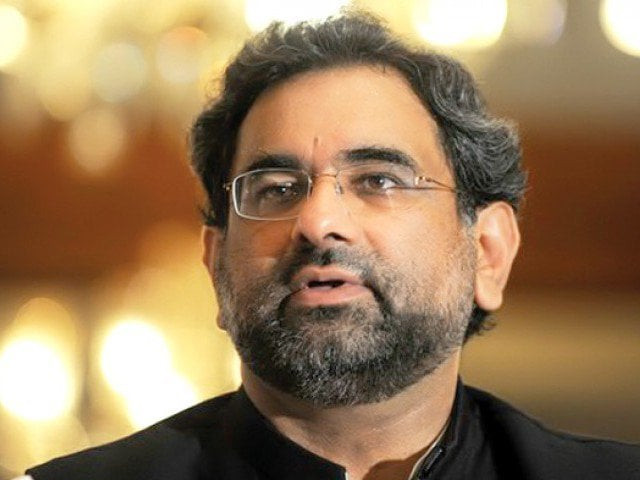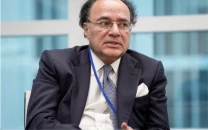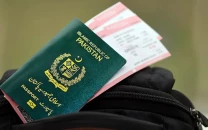PM understates debt to show ‘successes’
Figures presented by Abbasi are lower by 4% of GDP or $12.5b when compared with stats available on SBP website

PHOTO: FILE
Prime Minister Shahid Khaqan Abbasi on Monday made a false claim that Pakistan’s external debt was lower than five years ago, as he tried to present old and incorrect debt statistics to prove his point and resultantly understated external debt by $12.5 billion.
While addressing a news conference at his office, the prime minister also reiterated his announcement to give three basic salaries to all federal government employees in honorariums. But immediately after his presser, Finance Minister Dr Miftah Ismail again showed reluctance to honour the PM’s commitment.
"As a percentage of gross domestic product (GDP), Pakistan’s external debt was 20.5% by the end fiscal year 2016-17, which was lower than 21.4% recorded in the last year of the PPP government," claimed PM Abbasi while addressing a press conference three days before the end of his term in office.
The only way to make economic progress is by taking loans, claimed the prime minister.
However, the PM not only presented one-year-old figures despite fresh statistics being publicly available, he also gave the wrong figures. The move was apparently aimed at deflecting growing criticism over the country’s indebtedness during the third tenure of the PML-N government (June 2013- May 2018).
The external debt figures presented by Abbasi were lower by 4% of GDP or $12.5 billion when compared with statistics that are available on the website of the State Bank of Pakistan. The prime minister also deliberately understated the overall public debt.
Actual figures versus claims
The PM claimed that external debt to GDP ratio was 20.5% by June 2017. However, the SBP data showed that even in June 2017, the external debt-to-GDP ratio was 21.7%. When PM was challenged in the press conference that he was presenting wrong figures, he insisted that the SBP and his figures were the same.
The Public external debt was 24.5% of GDP or $73 billion as of March 2018, according to SBP. This was $12.5 billion higher than the figure claimed by the prime minister.
The prime minister also claimed that the total debt of the government was equal to 61.4% of GDP or Rs21.4 trillion. However, this figure is also incorrect. The total debt of the government was equal to 70% of GDP or Rs24 trillion at the end of March this year, according to the SBP.
In June 2013, the government’s public debt was equal to 60.4% of GDP or Rs14.3 trillion.
Due to growing indebtedness, over 30% of the budget is now consumed for debt servicing, leaving very little for social and economic development.
Overall, during the PML-N tenure, Pakistan’s external debt and liabilities have soared to a record $91.8 billion, showing an increase of over 50% or nearly $31 billion in the past four years and nine months, the State Bank of Pakistan (SBP) has reported.
The prime minister admitted that low exports and high imports remained a challenge for his party’s government. The International Monetary Fund (IMF)’s first post-programme monitoring report shows Pakistan’s gross external debt in terms of exports was 193.2% in 2013, which is projected to deteriorate to an alarming 316% in June this year.
Finance Minister Ismail claimed that Rs8 trillion additional debt was incurred during past five years to pay for provinces shares under the federal divisible pool and for infrastructure development. However, the provinces shares are not paid by taking debt, as their share is given from the federal tax collection.
The PM said that the PML-N has made a significant improvement in the economic conditions. By the end of the government’s tenure, the economic growth rate is high while inflation is low, said PM Abbasi.
The prime minister also said that a delay in offshore assets cases before the Supreme Court was creating uncertainty and the people were waiting for the court verdict before availing the tax amnesty scheme. The government has announced the tax amnesty scheme for domestic and offshore assets, but so far the response has been lukewarm.
The prime minister also said that the intervention by the judiciary and NAB in executive affairs has made it difficult to run the government efficiently.
Employees’ honorarium
To a question, the prime minister said that he has approved honorariums equal to three basic salaries for all the federal government employees to bring uniformity, unlike the previous practice when selected people would get the honorarium.
However, the Ministry of Finance is reluctant to implement the decision, arguing that it would cost a minimum of Rs100 billion.
The Finance Ministry would on Tuesday present a summary to the Economic Coordination Committee, as three honorariums cannot be given to all the federal government employees, said Ismail immediately after the PM’s press conference.
Without taking the name of Fawad Hassan Fawad who signed the letter on PM’s behalf, the Finance Minister said that it appeared as if the officer that signed the letter was fasting and was unable to comprehend the original summary’s content.
The finance minister said that his ministry had sent the summary for giving honorariums up to six basis salaries to the employees of Finance Ministry, FBR, Planning Division, Board of Investment etc.


















COMMENTS
Comments are moderated and generally will be posted if they are on-topic and not abusive.
For more information, please see our Comments FAQ